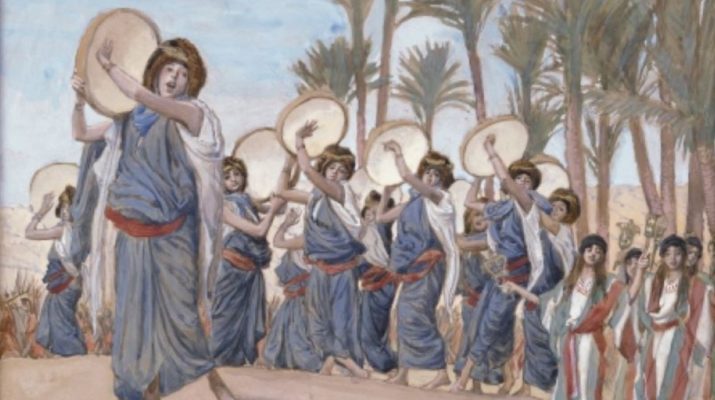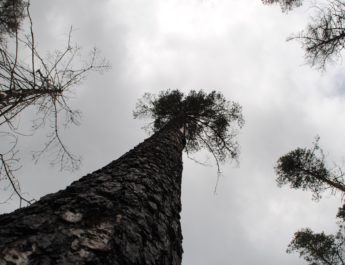Psalm 150
NL 207
1 PraiseA the Lord!B
Praise GodC in his sanctuary;D
praise him in his mightyE firmament!F
A “praise” = halal. This is to be clear – it originally referred to a sound, then a color. It was to shine and then make a show or boast then to rave. In a causative sense it came to mean celebrate, give glory, sing praise, or be worth of praise. Because of the celebratory nature of the word, it could also mean to give in marriage. This is where Hallelujah comes from.
B “Lord” = Yah. From YHVH (proper name of the God of Israel; God, Lord; the self-existent or eternal one); from havah (to become) or hayah (to be, become, happen)}. This is Lord or God – a shortened form of God’s most holy name.
C “God” = El.
D “sanctuary” = qodesh. This is set apart and so sacred. God is different from us and so God is holy/set apart. Things we dedicate to God’s service are set apart for God and so they, too, are holy, etc.
E “mighty” = oz. From azaz (to be strong, become fixed, be bold, prevail, be impudent; it means to be stout literally or figuratively. A Late Hebrew word). This is strength in the sense of force, majesty, praise, material and physical strength, the abstract notion of security. It can also speak of social or political power.
F “firmament” = raqia. 17x in OT. From raqa (to beat the earth in a fit of passion; by analogy to hammer something so that it is spread out or spread thin; by extension, decoratively overlaying something with metal). This is an expanse or extended surface. The dome of the firmament was thought of as metal hammered out and spread thin over the arch of the sky that we can see.
2 Praise him for his mighty deeds;G
praise him according to his surpassingH greatness!I
G “mighty deeds” = geburah. From gabar (to be strong or mighty; to prevail or be insolent). This is force in a literal or figurative sense. So, it could be strength, power, courage, triumph, victory, or mastery.
H “surpassing” = rob. From rabab (to be or become much or many, multiply). This is any kind of abundance.
I “greatness” = godel. 13x in OT. From gadal (to grow, grow up, be great, magnify, exalt). This greatness, arrogance, or magnitude. It can be used in a literal or a figurative sense.
3 Praise him with trumpetJ sound;K
praise him with luteL and harp!M
J “trumpet” = shophar. From shaphar (being beautiful or lovely). This is a ram’s horn, trumpet, or cornet. A shofar is still blown at Jewish festivals such as Rosh Hashanah (the Jewish new year celebration).
K “sound” = teqa. 1x in OT. From taqa (to clap, clatter, thrust, sound an instrument, hammer a nail, be a bondsman). This is a blast – like from blowing a trumpet or horn.
L “lute” = nebel. From nabel (to fall away, faint, wither, languish, sink; figuratively, being senseless, foolish, or wicked; to despise, disgrace, or fall to nothing, to be seen with contempt). This is a vessel, perhaps made of skins for holding liquids. It could be a skin, vase, or lyre as having a similar shape.
M “harp” = kinnor. Root may be to twang. This is a lyre or harp.
4 Praise him with tambourineN and dance;O
praise him with stringsP and pipe!Q
N “tambourine” = toph. 17x in OT. Perhaps from taphaph (to play a drum, timbrel, or tambourine). This is a timbrel or tambourine.
O “dance” = machol. 6x in OT. From chul (whirling around so dancing as in a circle or writhing in pain; used particularly for the pain of childbirth or from writhing due to fear; can also be falling in pain or waiting). This is a round dance.
P “strings” = men. 2x in OT – both in Psalms. Root may mean to apportion. This is an instrument, particularly one with strings like a harp.
Q “pipe” = uggab. 4x in OT. From agab (to desire, lust, breathe after, lust). This is pipe or flute. It is some kind of reed instrument – breathed into.
5 Praise him with clangingR cymbals;S
praise him with loud clashingT cymbals!
6 Let everything that breathesU praise the Lord!
Praise the Lord!
R “clanging” = shema. 18x in OT. From shama (hear, call, consent, or consider; implies listening intelligently, giving attention; obedience and action are often implied). This is something that is heart like a report, speech, fame, rumor, or fame.
S “cymbals” = tslatsal. 6x in OT. From tsalal (to tingle or rattle; can express shame or fear). This is something that clatters, whirrs, or buzzes. So, it could be a cricket or locust, a harpoon for the sound it makes or a cymbal as it sounds.
T “clashing” = teruah. From rua (to break or destroy something so figuratively, an ear splitting sound such as a call of alarm or a joyful sound). This is an alarm, trumpet sound, battle cry, rejoicing, joyful shout, or jubilee.
U “breathes” = neshamah. From nasham (to blow away, pant, gasp). This is a breath or blast – a puff like of wind. It is also a spirit or soul or divine inspiration or intellect. It could also be an animal. This is the word used for the breath of life when humanity was created in Genesis 2:7.
Image credit: “The Songs of Joy” by James Jacques Tissot, between ca. 1896 and 1902.




